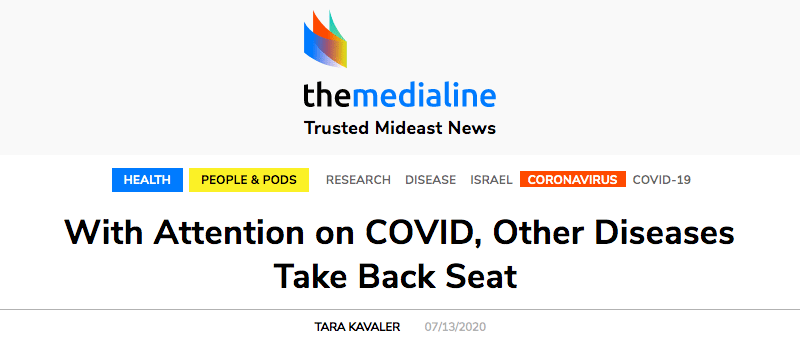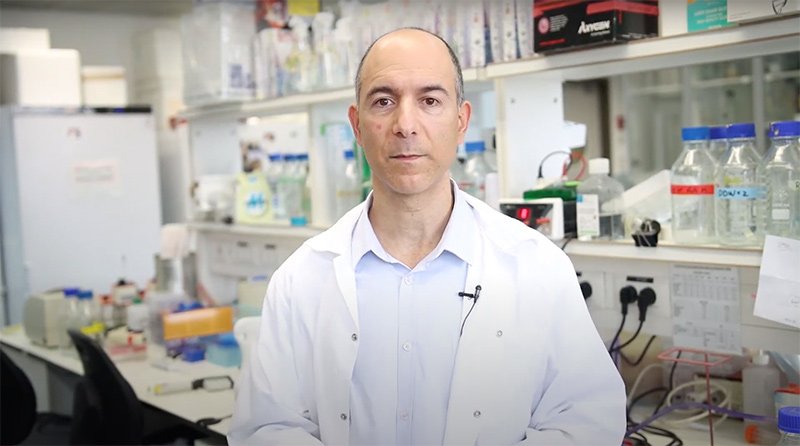

Duplicated research and stretched budgets stall progress on other medical conditions
With 19,300 active cases in the Jewish state, the best and the brightest Israeli minds are furiously seeking a cure or treatment for the novel coronavirus.
However, with limited resources and a finite number of doctors and scientists, prioritizing the research and treatment of COVID-19 comes at the expense of progress in tackling other diseases. In Israel and throughout the world, other diseases are taking a back seat to the race for a cure or treatment for the virus. While experts differ on how long this phenomenon might last, for some people, the delay in progress could be a death sentence.
Almost every sector of society has been affected by the coronavirus, and medical research has not been exempt.
Dr. Reuven Wiener, of the Department of Biochemistry and Molecular Biology at the Hebrew University, told The Media Line:


“If I look at the big picture, of course it will make for some delays in the progress on other diseases,” he added. “I want to believe that it will not prevent working on other diseases, but it does add a delay.”
While Prof. Rotem Karni, from the Hebrew University Faculty of Medicine, has been able to continue to focus on his research on cancer treatment and genetics, he says that many of his colleagues have switched to work on COVID-19. Some, like Wiener, a structural biologist, are able to easily do so because their research is more directly related. However, for others, the switch in target is also driven by budgets.
“Researchers are shifting some of the research toward coronavirus studies because there is funding around this topic. This is always a parameter that affects what scientists do because they need money to run the research and the lab,” Karni told The Media Line.
“Luckily, I have funding that is enough to do the research I want to on rare diseases and cancer, and this is why I’m doing COVID-19 research on a small scale. There are labs that shifted most of their research work toward COVID-19 research,” he said.
Karni says the scientific community is particularly worried that the corona-driven economic downturn will hamper their research in the future.

“Right now, we still don’t feel it because it’s too early, but all the scientists are really worried about this because we all know that people are dying from other diseases,” he said. “I also work on some rare diseases; the patients, kids, who suffer from these genetic conditions, they are in a race against time to get a cure.”
Karni argues that the attention to diverted coronavirus research will slow progress on tackling other diseases, especially when the studies duplicate others’ work.
“Always when you shift the research to one direction, it will affect the other fields. I think it will be a mistake to shift everything toward coronavirus research, especially because in many different countries people are doing similar research,” he said.
“Whenever there is redundancy, this is money that might affect the development of other treatments that are definitely at least as important as the COVID-19 research,” Karni added.
However, Chaim Putterman, professor at the Azrieli Faculty of Medicine at Bar-Ilan University and director of the research institute at the Galilee Medical Center, disagrees that the focus on the coronavirus is hurting progress on other diseases.
“Money that is invested in research has a trickle-down effect. If we understand the immunology of viruses, the COVID-19 virus, there might be a helpful connection made in a few months or a couple of years. For example, someone might say there is this particular protein that we found when we did our virology research and you could also apply that to understanding the pathogenesis of rheumatic diseases,” he told The Media Line. “Sometimes, a rising tide floats all boats.”
However, Putterman, a practicing rheumatologist, says that the treatment of COVID has resulted in a lowering of the quality of care that patients receive.
“It took time for us to set up electronic communication and e-visits,” he said. “, I think there were disadvantages for the care we gave that will eventually be measurable.
“It is very hard to inspect joints even on a high resolution , and impossible to feel them to get a sense if they are inflamed,” Putterman added. “Even when the e-visit works and the video was fine, and the patient was able to log in, and they were technologically savvy, those are not the same as an in-person visit.”
In addition, Putterman says that patients, in general, are coming in much less frequently due to fear of catching the coronavirus.
The deferment of care can be deadly, Prof. Eyal Leshem, director of the Travel Medicine and Tropical Diseases Department at Sheba Medical Center, says.
“The delayed care may result in delayed impact on increased morbidity and mortality because postponed care does not always cause immediate deterioration,” he told The Media Line.
Israeli hospitals are again setting up COVID-only wards, as they did during the earlier lockdown, which Putterman says may cause problems personnel-wise.
“If internal medicine physicians are reassigned to the corona ward and there are many medical personnel currently in isolation because of coronavirus exposure, then there are not going to be enough doctors to go around,” he said. “That’s what happened in Italy, I know this is what happened in New York, and I hope for the second wave it won’t happen here in Israel.”